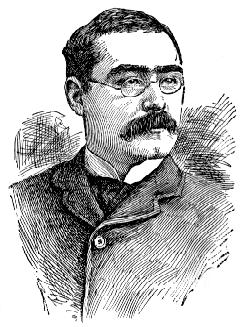|
|
 "Words are, of course, the most powerful drug used by mankind."
"Words are, of course, the most powerful drug used by mankind."
British author Joseph Rudyard Kipling (1865-1936) needs no introduction. Winner of the 1907 Nobel prize in literature, he is today remembered for "Gunga Din" (1888), The Jungle Book (1894), Captains Courageous (1897), Just So Stories (1902), Kim (1905), and other imaginative and rousing works of fiction and poetry.
Kipling's forays beyond the boundaries of conventional literature usually involved fantasy or the supernatural. But the few times he wrote genuine science fiction, the results rivaled his more famous works. His greatest contribution to the genre was the construction of a richly detailed "hard" SF world based on linked stories ("With the Night Mail" and "As Easy as A.B.C.") and brought to life with fabricated advertisements, news bulletins, letters, songs, etc. No one had done this before. Modern science fiction authors--especially screenwriters--continue to follow Kipling's lead.
Though Kipling lived most of his life in England, he was born in and spent
many of his childhood and early adult years in India (then part of the
British Empire). In 1892 he married an American, then traveled the world,
lived briefly in Vermont, and finally settled in England in 1903. His
firsthand knowledge of other lands and their peoples, combined with
meticulous research, lent realism to his writings. Upon his death, Kipling
was given a burial in Westminster Abbey--one of England's highest honors.
|
to Kipling's "With the Night Mail" |
to the Free Sci-Fi Classics table of contents |
to The World of the Wondersmith |